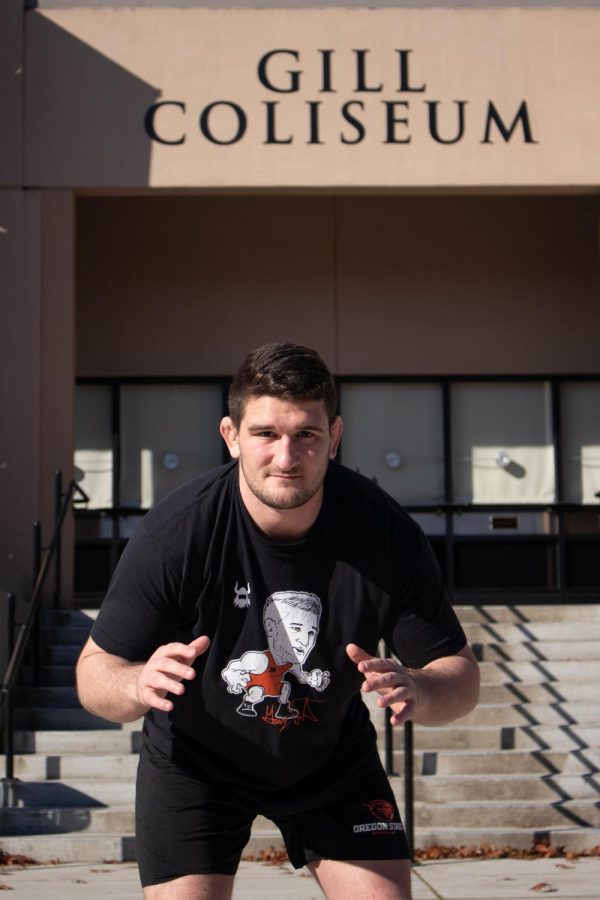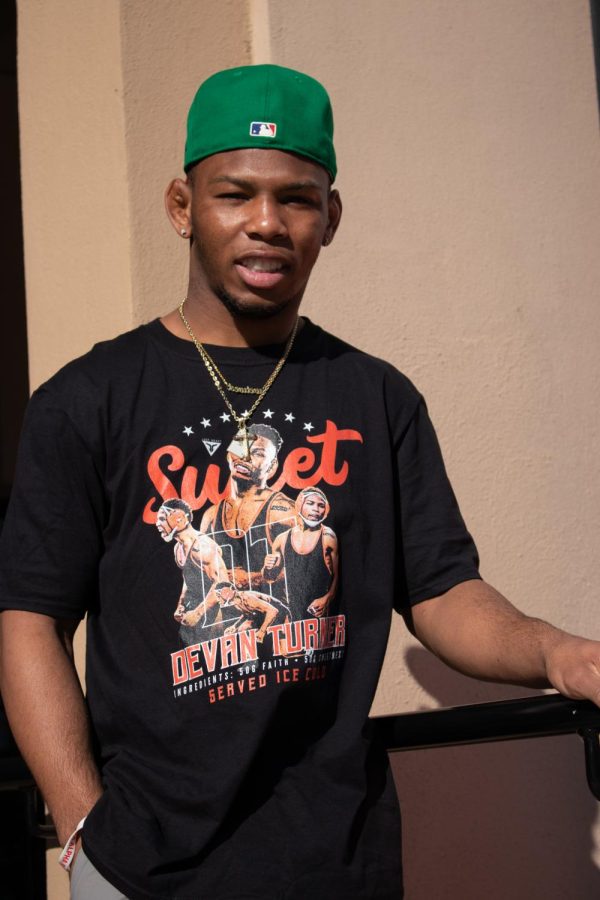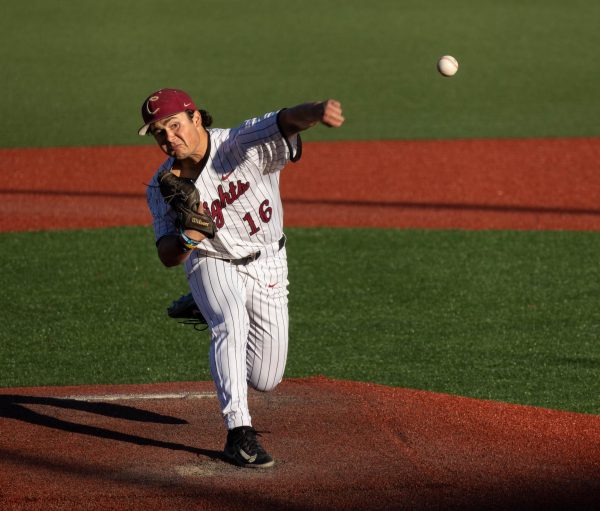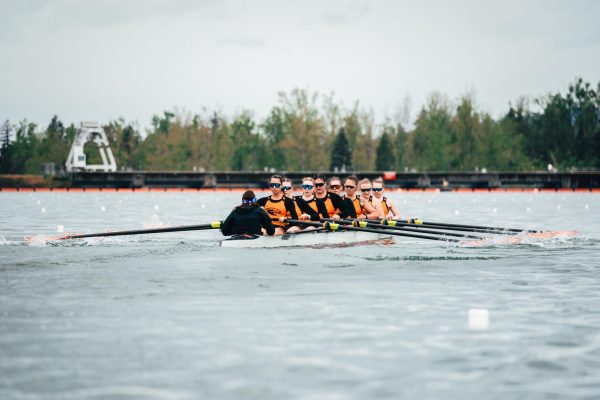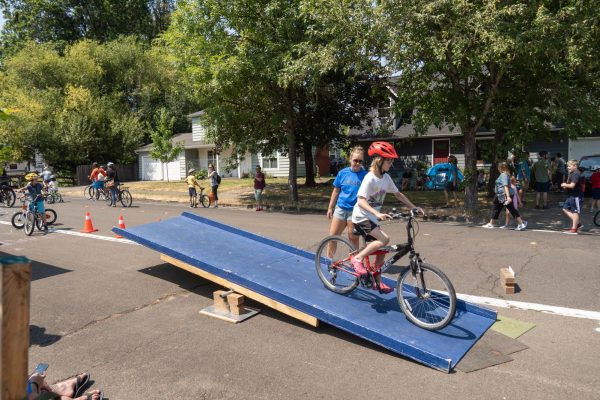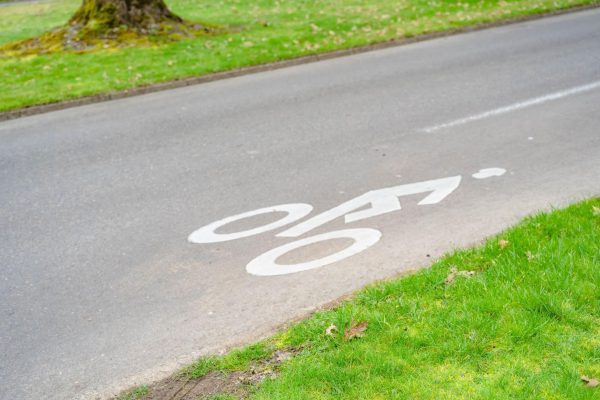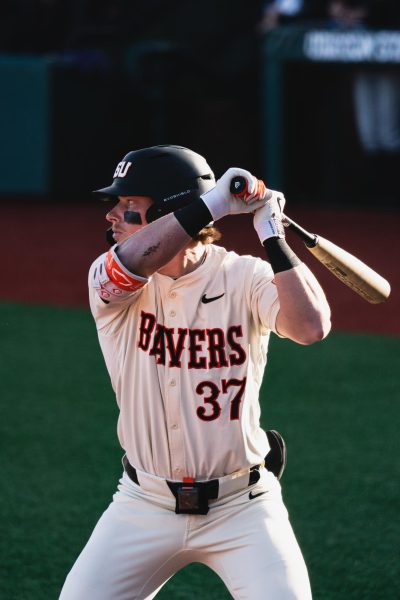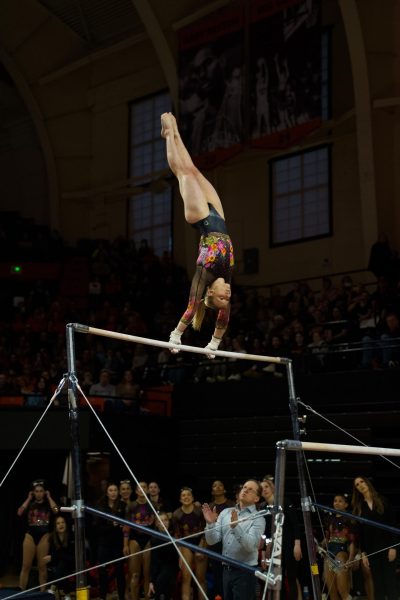Athletes explore their options with NIL
Both Devan Turner and Gary Traub, Oregon State Wrestlers, pose outside of Gill Coliseum on Feb 22. Both athletes have their own graphic t-shirt designs in which they sell online.
March 7, 2022
Oregon State University is one of the universities that has revolutionized the Name, Image and Likeness [NIL] landscape for student-athletes.
Before NIL laws were passed by the National Collegiate Athletics Association [NCAA] in 2021, Oregon State already had programs to help student-athletes succeed after graduation. Now, OSU‘s Athletics Department has been helping student-athletes such as wrestlers Devan Turner and Gary Traub take advantage of new NIL rules.
These rules have now allowed for college athletes at every level across the country to monetize their name, image and likeness when they previously weren’t allowed to under NCAA rules.
This is important because the NCAA has long prohibited athletes from accepting any outside money from any third party. If they violated those rules, they could have been suspended or lost eligibility.
One of the programs created by Oregon State is expOSUre, which is an educational program and tool kit designed to help all 475 student-athletes across the 17 athletics programs maximize their name, image and likeness.
The Oregon State Athletics Department partnered with the College of Business and Opendorse, which is a software that allows student-athletes to grow their own personal brands. This allows athletes access to resources such as industry-expert training, educational resources and personal brand assessment to prepare them for NIL in college.
Devan Turner, a sixth-year wrestler on the Oregon State wrestling team, was satisfied with the rule change.
“I think we always should have been able to use our name and stuff to get endorsements,” Turner said. “If an energy drink company reaches out to me, I always should have been able to be like, yeah, I’ll use my name to help promote this… I think they should have been doing that, it is unfortunate that we could not do that before.”
Turner did have his own clothing brand back in eighth grade, but had to stop sales when he came to Oregon State, which hurt business opportunities for him.
“I had to put everything on complete hold and lost, you know?” Turner said. “You lose customers, you lose connections with the people you were using, and the brand really was just stagnant, so I couldn’t do anything with it.”
Under the new rules, Turner signed with an agent and has partnered with different brands, earning sponsorships from supplement companies and has even released his own shirt, which he released in collaboration with Just Heart Apparel. After the design process, Turner ended up deciding on a graphic tee design that played off his nickname,
“Sweet DT.”
“If I was to make my own design right now, I would still make it like that graphic tee, I would have the sweet DT, big,” Turner said. “I would have something like 50% sugar, 50% faith and I would have a tea on it, a sweet tea. I would’ve tried to make a more comedic, humorous type, playing off Sweet DT.”
Turner isn’t the only other wrestler on the Oregon State wrestling team that has his own NIL deals and t-shirt. Turner’s teammate, Gary Traub, is a graduate student wrestler and also has his own shirt with his image on it. Traub transferred to Oregon State after four years at Ohio State University.
“It was kind of weird,” Traub said. “When I found out about it, I was kind of in limbo. I was in the [transfer] portal already and I wasn’t going to meetings at Ohio State with the wrestling team. I heard rumors that NIL stuff was coming through, I was like, ‘Oh that’s not going to happen this year or when I’m here.’”
Traub mentioned that it wasn’t until he transferred to Oregon State that he learned about the recent passage of updated NIL rules that would allow him to make money off the new rules.
Traub partne
red with Barbarian Apparel to design a couple of t-shirts, one of them playing off his nickname “Gas Tank Gary” from his time at Ohio State. Traub had a personal connection with the owner of Barbarian Apparel and reached out to the owner once the NIL deals were passed by the NCAA.
“I feel like having a relationship with the guy before he designed the t-shirt made it really easy for me to give my input,” Traub said. “The first design he showed me, I loved it—the first one, the one of the caricature of me in my wrestling stance. I think it was in the first design they were red, I had to tell him you got to change it to orange now. The other one that says ‘Gas Tank Gary,’ it was originally just the letters, big letters, and it was his idea to change the A’s to little gas cans.”
Traub said OSU’s resources have been beneficial as he has been to examine and understand the NIL contracts that businesses offer him.
“The app makes it really simple,” Traub said. “It lays out a prompt for you: this is what they want from you, this is how you’re going to get paid. You can negotiate or take it as is and terms for each endorsement, it’s a good substitute for people that need that.”
The long-term impacts of NIL in college athletics remain to be seen as there are not a lot of rules that regulate how the money is distributed, once earned by the athlete. The amount of money earned by athletes using NIL is not always equal as more popular college sports may lead to more money in contracts than sports that do not bring in as much revenue.
Turner acknowledged the discrepancies in how NIL revenue can be distributed by sports and popularity.
“Majorly it’s going to be football players, basketball players and maybe some baseball players, but it’s the sports that most people watch and it’s going to be the big names,” Turner said. “The reason it hurts non-revenue [generating] sports like wrestling, lacrosse and water polo, all those sports—it hurts us because now, instead of donors donating straight to the athletic department at Oregon State, they’ll donate strictly to one of the star players on the football team.”
However, even with these uncertainties, NIL will impact and change the college athletics landscape for years to come. Many athletes such as Turner and Traub have found it exciting that fans, friends and family members have been able to buy their merchandise under these rules.
“I know my dad was really excited about it, when it started, he ordered 15 shirts. giving them out to family,” Traub said. “It’s been cool seeing pictures of people wearing them.”












































































































